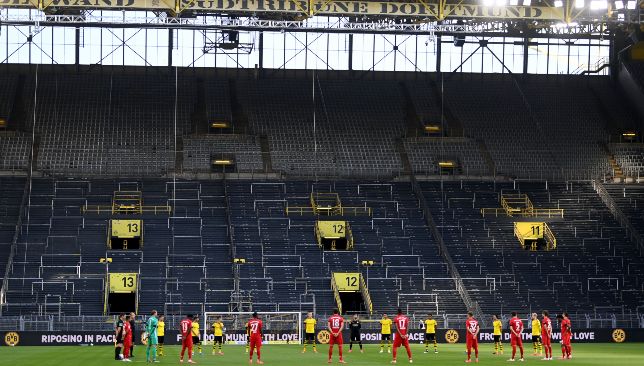
We needn’t have worried.
The blistering tempo, from kick-off, of Tuesday’s Der Klassiker blew away fears about football without fans. It took less than a minute for Bayern Munich’s Jerome Boateng to clear off the line from Borussia Dortmund’s goal-scoring prodigy Erling Braut Haaland, while Lukasz Piszcek was similarly diligent moments later to athletically block Serge Gnabry’s goal-bound effort at the other end.
The clincher when it came, in both this match and, surely the Bundesliga title race, required rare technique from the commanding Joshua Kimmich.
This was an exhibition of football excellence and exemplar of how competitive spirit can remain undiminished amid, even, the cruel hardships of a global pandemic.
Yet, a lingering sense of the bittersub (bittersweet) endures long after the final whistle.
Elite footballers will serve up engaging action, no matter the surroundings. This arresting clash proved it.
But a sense of regret is still palpable about what could have been when 81,365 souls aren’t packed into a fevered Signal Iduna Park. It strikes at the very heart of sport’s enduring purpose.
Der Klassiker’s place on the European game’s road map is well earned. An impassioned 55-year derby, ignited by regional rivalry and intertwined pursuit of domestic supremacy.
Dortmund’s gargantuan Die Gelbe Wand (The Yellow Wall) in mid-week would have, typically, represented the snarling, sonorous manifestation of the host’s desire to banish the invaders back to Bavaria. These are not, though, typical times.
Encouragement from coaching staff and the accentuated reverberation caused by ball on foot provided an altered experience made eerier by the back drop of empty stands.
This psychological challenge has been admirably conquered by Bundesliga players from across the division since May 16’s awaited restart, following two months of unforeseen inaction. A drop in stimulation, and stimulus, provided by the loss of baying supporters has not unduly impacted exceptional action on the pitch.
They have not been purposefully forgotten, or left behind. No matter the, understandable, banners at Borussia Monchengladbach that proclaimed “Fussball ohne fans ist nichts” (“Football without fans is nothing”) and “Fur Borussia, gegen geisterspiele” (“For Borussia, against ghost games”).
Competitors and organisers were open about the pressing financial need behind this unfamiliar resumption. So, too, how suboptimal it is to precede within silent arenas.
The estimated €770 million loss if the top-two divisions were cancelled, simply, could not be countenanced.
No amount of fake fan noise pumped in by broadcasters, 13,000 cutouts on Monchengladbach’s terraces or prospect of an application created in Japan to let supporters cheer or jeer from home can bridge this gap.
A necessary pragmatism has been embraced. Dortmund and Bayern stood as the most-high-profile manifestation of this altered reality.
More than 80,000 partisan supporters provide a soundtrack impossible to replicate. This bond between team and supporter is devastating to break.
Germany’s finest are, however, playing on without them to ensure their eventual return, rather than in spite of them.